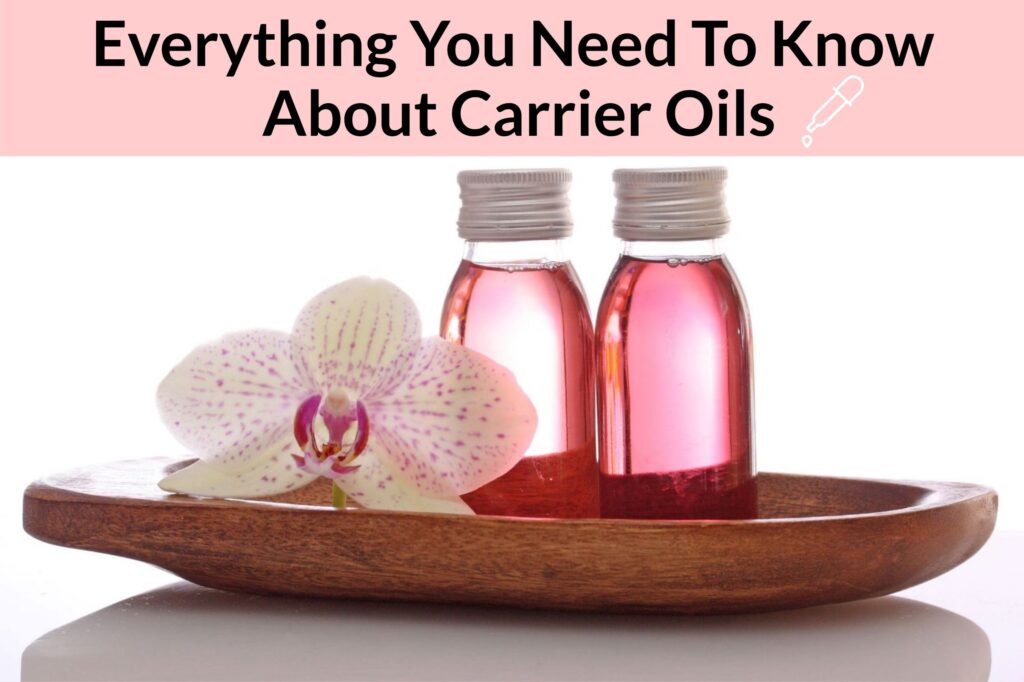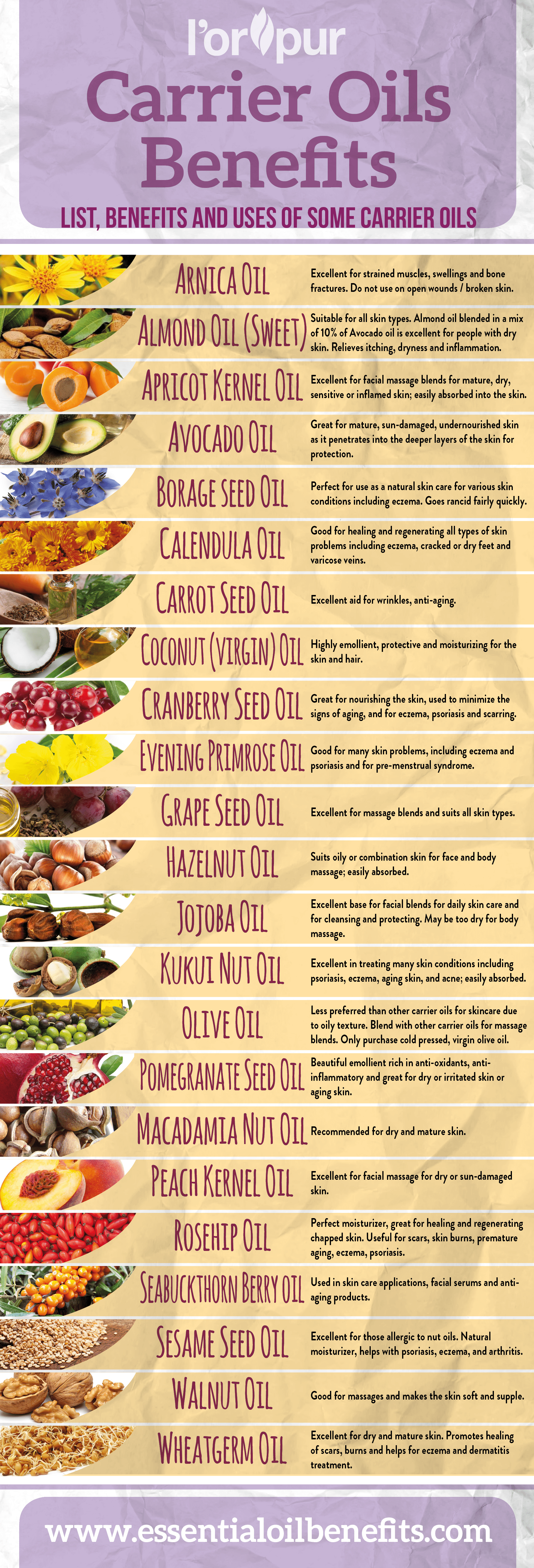An Introduction To Carrier Oils
Carrier oils do not often get the recognition of essential oils. There is a common perception that they lack the many therapeutic benefits of essential oils, which is true, nonetheless, carrier oils have plenty of other benefits that should not be overlooked.
What Are Carrier Oils?
Carrier oils are derived from the fatty parts of a variety of plants, such as from the nuts, kernels and seeds. They lack the volatility (ability to evaporate) and concentration of essential oils and for that very reason, this makes them ideal for diluting essential oils. Just to note that carrier oils do not have much aroma of their own.
When essential oils are used topically, carrier oils act as the transporting or carrying agent, hence the term “carrier” oils.
Although there are hundreds of oil-bearing plants, only a few are produced commercially. Some of the best known carrier oils include coconut, jojoba, almond and argan oil. Certain products such as butter, margarine, petroleum jelly and mineral oils are not carrier oils and should not be used as medium for diluting and transporting essential oils; more on this below.
Prior to use in massage applications, carrier oils are the medium used to dilute essential oils for the following reasons:
- They promote the absorption of essential oils into the skin and facilitate the massage process
- They contain fatty acids and other valuable nutrients and have complementary therapeutic benefits
When it comes to carrier oils, make sure you read the label on the bottle before making your purchase: look for the term “extra virgin / cold pressed” as they are the best carrier oils for use because these are the first pressed oils from the crop.
Why Do You Need To Use A Carrier Oil?
As mentioned above, pure essential oils are too strong and concentrated to be used directly on your skin; they will cause skin irritation.
Therefore, when applying essential oils topically, they should be diluted with a carrier oil so they can be applied / massaged into the skin.
Essential oils are generally sold in 5ml to 15ml bottles and therefore will not go very far if used at full concentration (they can be expensive too!). However, when diluted with a carrier oil they will cover a large area and are just as effective.
The quality of the carrier oil is just as critical as the quality of the essential oils. You should only use pure, unadulterated oils extracted by cold pressing; the exception being Grapeseed oil which cannot be cold-pressed.
Extractions that are from heat / solvent processes can easily destroy important minerals and vitamins found in the oils.
Mineral Oils
Mineral oils are made from petroleum. Although they are often used as a base for baby oils, they are not suitable for blending with essential oils as they do not absorb into the skin. They form a barrier on the surface of the skin and therefore stop the skin from operating effectively.
How Are Carrier Oils Produced?
I will briefly cover the two main methods of producing carrier oils; they are cold pressed extraction and maceration.
1. Cold pressed extraction
For this method of extraction, the seeds of a particular plant are cleaned, crushed and cooked at an optimum temperature to extract the oil.
The controlled temperature is vital as it softens the seeds without altering the oil’s properties. The cooked seed material is then pressed without any additional source of heat, hence the term “cold-pressed”.
2. Maceration
Macerated oils are simply produced by soaking fresh herbs in a vegetable oil (such as sweet almond) so that the essential oil from the herbs seeps into the oil over a few weeks (4-8 weeks). The oil is then drained and filtered before use.
How To Mix Essential Oils With Carrier Oils?
The first step is to check the recipe, if you are using one. Most recipes will guide you on how to mix essential and carrier oils with specific directions on proportions.
Generally, I recommend a 2% dilution for most essential oils. This simply means that the essential oil should only make up 2% of the total amount of oil.
To achieve a 2% dilution, you should add 12 drops of an essential oil for every 30ml (1 ounce) of carrier oil such as Hazelnut.
Because of differences in temperature, oil viscosity and type of dropper, 12 drops per ounce is not a very precise science. But it is close enough to yield a safely diluted oil blend.
You can change the ratios depending on the amount of carrier oil you plan on using. For instance, if you want to maintain a 2% dilution rate, you can also add 24 drops of essential oil to 2 ounces of carrier oil.
If on the other hand, you only want a 1% dilution (for example for use on kids), then you should add 6 drops of essential oils to 30ml (1 ounce) of carrier oil.
This is a rule of thumb (and not a strict guideline) meant to provide some guidance when a recipe does not specify the amounts of each oil type.
Of course, you can change the dilution rate depending on the circumstances. For example, some essential oils such as wormwood are considered toxic and should only be used at dilution rates of 1% or less.
You can also check the label of an essential oil bottle for advice on concentration and dilution.
How To Choose The Right Carrier Oil?
Different carrier oils have different properties and benefits. Some carrier oils are excellent for the hair while others are ideal for your skin/face.
So the most important thing is to determine the properties you are looking for in a carrier oil. For instance, if you are making a homemade lip balm, you will need a carrier oil that has great moisturizing properties.
Don’t worry as I have done all the hard work on the properties of different types of carrier oils to help you decide which one is best for your recipe. Some examples are:
- Avocado oil is one of the best moisturizers, making it perfect for skincare products.
- Jojoba oil absorbs easily into the skin and is commonly used for massage and bath products.
- Hazelnut oil is ideal if you have a skin prone to acne and inflammation.
- Olive oil is great for hair products and helps repair and strengthen hair.
- Choose the right carrier oil for your skin type. For sensitive skin, good oils include grapeseed and apricot kernel oils. For dry skin, avocado and jojoba oil are among the best oils. For combination and oily skin, try neem or grapeseed oils.
In addition to benefits, it is also important to check other properties of a carrier oil such as smell and viscosity.
Some oils such as olive and sesame have a fairly strong scent that may be unpleasant to some people. If you have to use these oils, you can always use complementary essential oils that can mask the smell of the carrier oil.
Another important consideration when using a carrier oil is whether you are allergic to it. If you are allergic to the fruits, nuts or leaves of a certain plant, you will most likely be allergic to the carrier oil derived from it too.
I always recommend carrying out a skin patch test to determine if you have any sensitivity towards a particular carrier oil (or essential oil for that matter).
Just put a drop on your inner forearm and place a bandaid over it. Leave the bandaid in place for 24 hours and check for any adverse reaction. In case you start to experience any mild reaction, immediately remove the bandaid and wash off the oil with water. Do not use that particular oil.
In addition, I have created a Table with some of the most popular Carrier Oils and their benefits for you to enjoy.
Top 5 Carrier Oils For The Skin/Face

1. Jojoba oil
A common addition to commercial and homemade beauty products for the face. Jojoba oil is almost similar to the natural sebum found on the skin, making it ideal for all skin types. It penetrates the skin deeply, carrying its moisturizing and anti-inflammatory benefits deep into the skin.
2. Avocado oil
A wonderful moisturizer, an excellent oil for those with dry skin types. Furthermore, it is packed with omega-3 fatty acids and various vitamins, all of which have numerous benefits for the skin. Avocado oil can help slow down skin aging, repair sun-damaged skin and mitigate inflammatory conditions like eczema.
3. Rosehip seed oil
Known for its rejuvenating properties, rosehip seed oil is perfect for aging skin. It is also a deep moisturizer, helping your skin remain soft, smooth and supple. When used regularly, it can also help reduce the appearance of facial scars especially for those with previous cases of acne.
4. Argan oil
High in anti-aging components including vitamin E and antioxidants. It reduces the appearance of fine lines and wrinkles and has been shown to induce skin tightening.
5. Kukui Nut Oil
A good protective oil. If you spend a lot of time outdoors, using this oil in your beauty products can help protect your skin from sun, wind, pollution and salt.
This keeps your skin looking and feeling young. Its ability to penetrate deep inside the skin makes it a good moisturizer. In addition, it is often used to combat psoriasis, eczema, scars and sunburn.
Best 5 Carrier Oils For Hair/Hair Growth

1. Olive oil
Highly effective at making hair stronger and boosting hair growth. When added to homemade hair products, it can help with dandruff, hair breakage, split ends and dull hair. Use it often and you will notice that your hair is softer, more vibrant and stronger.
2. Coconut oil
Another hair-care powerhouse. One of its best attributes is moisturizing. By locking in moisture, it keeps your hair soft and smooth. It also boosts hair growth, giving you more volume with repeated uses.
3. Sesame oil
Coconut oil is not for all hair types. In some people, it may cause split ends and hair breakage. In such cases, sesame oil is a great alternative. It fights dandruff, strengthens hair, moisturizes it and boosts hair growth.
4. Grapeseed oil
An odorless and colorless carrier oil full of vitamin E, which helps increase hair volume. It also contains various minerals and proteins that nourishes the hair and makes it stronger. It does not leave the hair with a greasy texture.
5. Aloe Vera oil
Like most oils in this list, Aloe Vera oil is effective at moisturizing the hair, keeping it soft and smooth. Its anti-bacterial and anti-fungal properties help with scalp conditions such as dandruff, psoriasis and eczema. It is also good at boosting hair growth.
Best 5 Carrier Oils for Massage and Aromatherapy

1. Sweet almond oil
Medium viscosity oil, giving it a good slide during massages. Additionally, almond oil has a mild flavor that is not too overwhelming. When used on the skin, it can help combat dryness, itching and inflammation. Avoid it if you have a nut allergy.
2. Apricot kernel oil
Looks almost similar to sweet almond oil even in texture. It is a popular massage oil because it absorbs easily into the skin and does not leave the skin greasy. If you are allergic to nuts or prefer not to use sweet almond oil, apricot kernel oil is a good alternative.
3. Sunflower oil
Also light and non-greasy, sunflower oil is perfect for massage. It is light but its rich flavor makes it ideal for aromatherapy. Because of its short shelf life, only buy it in small quantities. Avoid it if you are allergic to the sunflower plant.
4. Babassu Oil
Not a common oil though it carries plenty of benefits. It is almost similar in texture and flavor to coconut oil, making it a good alternative for those who cannot use coconut oil. Babassu’s medium viscosity makes it great for a relaxing massage while its coconut aroma makes it a good aromatherapy oil.
5. Camelina oil
High in vitamin E, making it an effective anti-oxidant. Because of its pain and inflammation relieving effects, it can be used in massage therapy for those with arthritis. Camelina oil has light viscosity and a mild aroma.
The Bottom Line
The choice of carrier oils does matter when it comes to aromatherapy:
- Carrier oils have a positive effect on your skin and hair
- Carrier oils is one of the key medium for delivering essential oils to your system
- The combination of essential oils / carrier oils increase the safety and efficiency of a particular blend when used together
Carrier oils do turn rancid and therefore, they should be used within 18 months. The exception to this is Macadamia and Jojoba oils, which can last for up to 10 years if stored correctly (dark glass bottles).
I hope that my guide will assist you in finding the right carrier oils for your intended use. Good luck! As always, hit me with an email if you need any clarification or help.






